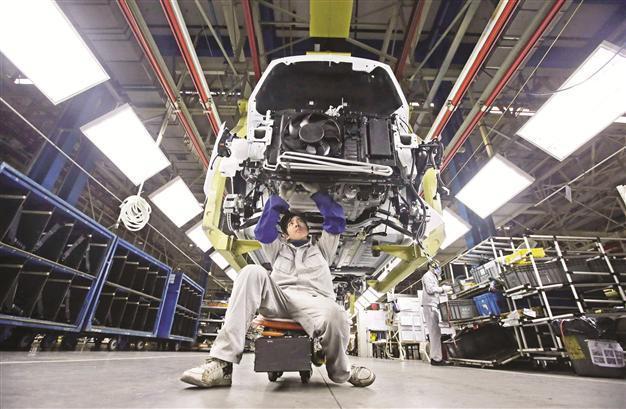Peugeot blames eurozone crisis for sale drop
PARIS - Agence France-Presse

Peugeot’s sales in Europe has shrunk 16.5 percent because of the problems in southern Europe and Iran.
French auto giant Peugeot, recently rescued by the government, reported yesterday a 16.5 percent plunge of sales last year due to the problems in southern Europe and Iran and despite strong demand in Russia and China.The group blamed the effects of the debt-crisis in southern Europe for the extent of the sales plunge. But the director for brands in the business, known fully as PSA Peugeot Citroen, said it expected sales to rise this year, excluding the sale of parts for assembly in Iran and despite expected further contraction of the European market.
PSA’s Brand director Frederic Saint-Geours said he expected group sales to rise without providing figures. He said in a statement that “the group is being hit full blast by the lasting fall of European markets” which he estimated would shrink further by between 3 and 5 percent this year.
PSA gave new insights on Jan. 2 into its problems, saying that sales in its home market France had dropped by 17.5 percent last year. Sales in Italy, Spain and Portugal fell even harder.
The group does 60 percent of its business in France and southern Europe. However, sales held up in Germany and rose in Britain.
Dependence on Europe to decrease
Overall the group is reducing its dependence on Europe, with sales elsewhere rising from 33.0 percent of the total in 2011 to 38.0 percent last year and a target of 50 percent in 2015.
The group has factories in Russia and in China and sales in Russia surged by 7.4 percent to78,000 and in China they rose faster than the market, by 9.2 percent to 442,000 vehicles. However, the group suffered setbacks in Latin America, with delays in the extension of a factory at Porto Real in Brazil where it intends to double production capacity by 2015.
PSA is struggling to restructure its business with a controversial plant closure in France, the shedding of 8,000 jobs, a strategic alliance with US group General Motors and a drive to expand sales outside Europe.
In October 2012, the French government guaranteed financial support for the group of between 5 and 7 billion euros ($6.54-$9.15 billion) in the form of support for the subsidiary providing credit to customers and dealerships. The EU made clear yesterday that it considered the rescue to amount to help for a restructuring of the entire group.
















